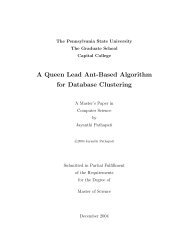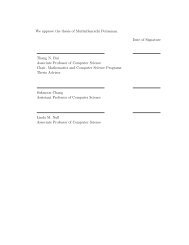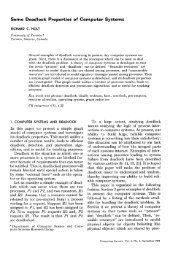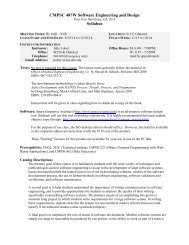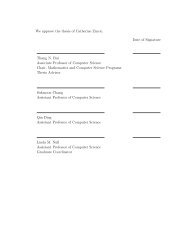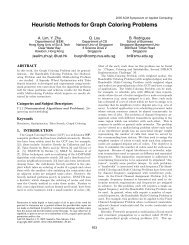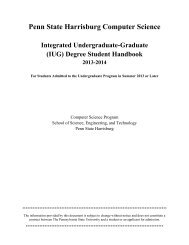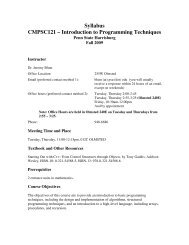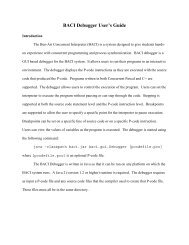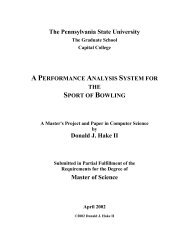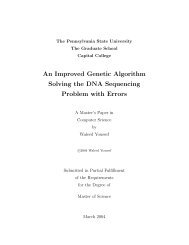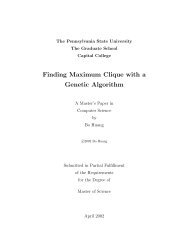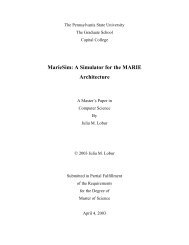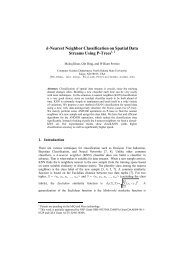CMPSC 312 Computer Organization and Architecture - Penn State ...
CMPSC 312 Computer Organization and Architecture - Penn State ...
CMPSC 312 Computer Organization and Architecture - Penn State ...
You also want an ePaper? Increase the reach of your titles
YUMPU automatically turns print PDFs into web optimized ePapers that Google loves.
<strong>and</strong> dataflow architecture11. Use performance analysis <strong>and</strong> management to both optimize <strong>and</strong> specify system performance<strong>and</strong> system softwareMETHODS OF INSTRUCTION:<strong>CMPSC</strong> <strong>312</strong> consists of reading <strong>and</strong> lecture components. The reading will help to acquaint the studentwith the terminology in the field <strong>and</strong> introduce concepts in computer organization. The lectures willexplain the more difficult concepts in the reading <strong>and</strong> will also include information not found in the text.The student is responsible for all material covered in the chapters as stated on the syllabus, regardlessof whether the topic or material is discussed in lecture.TENTATIVE COURSE OUTLINE -- <strong>CMPSC</strong> <strong>312</strong>This is a tentative schedule. We will adhere to it as closely as possible.Week#WeekofTOPICREADINGS1 1/12/15 Introduction, History, Concepts, Overview Chapter 12 1/19/15 MLK Holiday- No Class 1/19/15Data Representation Part I Chapter 2Drop period ends Jan. 21 Add period ends Jan. 223 1/26/15 Data Representation Part 2 Chapter 24 2/2/15 Data Representation Part 3 Chapter 25 2/9/15 Digital Circuits Part IEXAM 1 Covers Chapters 1-2 <strong>and</strong> related lecture materialChapter 36 2/16/15 Digital Circuits Part 2 Chapter 37 2/23/15 Basic Machine <strong>Organization</strong>: MARIE Part I Chapter 48 3/2/15 Basic Machine <strong>Organization</strong>: MARIE Part 2 Chapter 4Spring Break - No Class March 9th or 11th9 3/16/15 Instruction Set <strong>Architecture</strong>s – Part 1EXAM 2 Covers Chapters 3-4 <strong>and</strong> related lecture material10 3/23/15 Instruction Set <strong>Architecture</strong>s – Part 2Memory Hierarchy <strong>and</strong> <strong>Organization</strong> Part 1Chapter 5Chapter 5Chapter 611 3/30/15 Memory Hierarchy <strong>and</strong> <strong>Organization</strong> Part 2 Chapter 612 4/6/15 Input/Output Part IEXAM 3 Covers Chapters 5-6 <strong>and</strong> related lecture materialChapter 7Late drop deadline April 10thPage 2 of 4
13 4/13/15 Input/Output Part 2 Chapter 714 4/20/15 Performance Analysis <strong>and</strong> Management Chapter 1115 4/27/15 Embedded Systems Chapter 10Classes end on May 1FINAL EXAM IS COMPREHENSIVE - Date, time, <strong>and</strong> location to be determined.SOFTWARE:We will be using a public domain circuit design <strong>and</strong> simulation package called Logisim. This software isavailable for free download for your computer. It can also be run on the machines in the Sun Lab. (Ifyou want to use the machines in the Sun lab, you will need a student account if you do not already haveone.).TEXTBOOK INFORMATION:Text: The Essentials of <strong>Computer</strong> <strong>Organization</strong> <strong>and</strong> <strong>Architecture</strong> 4/e, by L. Null <strong>and</strong> J. Lobur, ISBN:978-1284045611.GRADING INFORMATION:3 Written exams @ 100 points each = 300 pointsComprehensive Final Exam 150 pointsHomework <strong>and</strong> quizzes 50 pointsThe following table gives the percentage of points needed to guarantee the associated final grade in thecourse.A- 90 - 100% D 60 - 69%B- 80 - 89% F below 60%C 70 - 79%PLUS/MINUS GRADES WILL BE ASSIGNED AT THE DISCRETION OF THE INSTRUCTOR. THE INSTRUCTORRESERVES THE RIGHT TO ARBITRATE BORDERLINE CASES.ADDITIONAL CLASS POLICIES:Class PoliciesAttendance: You are expected to attend all class meetings <strong>and</strong> tests. If you have a legitimate <strong>and</strong>unavoidable reason for missing a test or assignment deadline, you must discuss this with the instructor inperson or by telephone (not by email or leaving a message) at the earliest possible time <strong>and</strong> prior to thetime of the test or deadline, <strong>and</strong> you must provide written documentation to substantiate the absence.Assignments: Due dates will be specified on each homework assignment. An assignment is due at thebeginning of the class on the specified due date. Late assignments will receive no credit. Unlessotherwise specified, these rules apply to projects as well.Exams: STUDENTS ARE EXPECTED TO TAKE EXAMS AT THE SCHEDULED TIMES. Examtimes will be announced in class. If you must miss a exam it is your responsibility to notify the instructorat least 24 hours PRIOR to the exam, either by e-mail or in person. The instructor will respond to e-mailas quickly as possible (usually in less than four hours during the day). Failure to follow thesePage 3 of 4
instructions may result in a deduction of points on the exam, or possibly a grade of zero on the exam.Make-up work will ONLY be given for valid <strong>and</strong> verifiable reasons. Valid reasons include illness,family emergencies, <strong>and</strong> school-sponsored trips. You must provide written documentation for illnesses,emergencies, <strong>and</strong> trips.Class Conduct: Conduct in class that adversely affects the ability of other students to learn willadversely affect your grade. I expect all students to be courteous to others during class. This includesarriving on time, refraining from unnecessary talking or reading newspapers, not interrupting others,raising your h<strong>and</strong> to speak, <strong>and</strong> turning off cell phones <strong>and</strong> pagers (or putting them on vibrate).Notebook computers are allowed for note taking, but should not be used for game playing or otherpursuits not related to class. Also, students are expected to finish their meals, <strong>and</strong> partake of all snacksprior to entering the classroom. Any other distracting or disruptive behavior is also strictly prohibited.E-Mail: E-mail messages to the instructor's account are welcome where appropriate. Please put yourname <strong>and</strong> <strong>CMPSC</strong> <strong>312</strong> under the SUBJECT header when you send e-mail. Failure to follow this formatmay result in your e-mail l<strong>and</strong>ing in a spam filter!Course Web Page: All important announcements made through e-mail will also be posted on the courseWeb page at: http://cs.hbg.psu.edu/cmpsc<strong>312</strong>. It is the responsibility of the student to regularly check theWeb page. Failure to receive a course e-mail, <strong>and</strong> failure to regularly check the course Web page doesnot relieve the student of the responsibility for information posted there.Working Together on Assignments: Students can learn a great deal by working with others, sharinginformation <strong>and</strong> ideas. Students may work together on the homework problems, provided that themethods used promote a learning environment for all involved. Specific rules follow:1. You may discuss assignments with your classmates. (In fact, you are encouraged to do so!)2. When it comes time to do your assignment (actually write the answer), you must write your ownproblem solution <strong>and</strong> turn in your own homework (unless specified otherwise in the assignment).3. In particular, you may NOT: copy in part or in totality from another student's homework problems,get someone else to do your work, or submit the work of a group as your own work. These acts ofplagiarism will result in a 0 for all students willingly involved for the first offense; subsequent offensescould result in a failing grade in the class.For information regarding Academic Calendar, Academic Integrity, Americans with Disabilities Act,Learning Center Information, <strong>and</strong> Weather Cancellation Policy go to:http:// cs.hbg.psu.edu/additional-syllabus-info.Page 4 of 4



